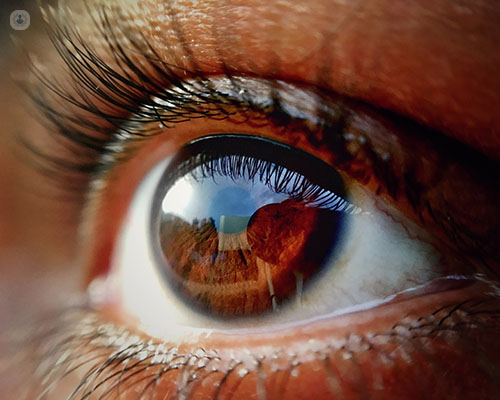Vitreoretinal diseases explained
Autore:Vitreoretinal diseases can have a significant impact on your vision and in severe cases, can even result in loss of vision. Esteemed consultant ophthalmic surgeon Mr Andrej Kidess explains everything you need to know about vitreoretinal diseases, including surgery options.
What does vitreoretinal mean?
Vitreoretinal is the term used in relation to the vitreous body and the retina. The vitreous body is a gel-like filling the back of the eye and the retina is lining at the back of the eye. The macula is at the centre of the retina.

What are vitreoretinal diseases?
Vitreoretinal diseases are conditions that affect the retina at the back of the eye and the vitreous fluid around it.
Primary risk factors for vitreoretinal diseases include ageing or diabetes. Examples of these vitreoretinal diseases are:
- Macular degeneration
- Macular hole
- Epiretinal membrane or macular packer
- Diabetic retinopathy and maculopathy
- Retinal detachment
A disease in the macula can cause temporal or permanent loss of central vision.
What are the symptoms of a vitreoretinal disease?
There are multiple symptoms of a vitreoretinal disease. The main symptoms are as follows:
- Floaters in the visual field, especially the sudden onset of spots
- Flashes of light
- Sudden vision loss
- Dimming or distortion in the central vision, such as wavy lines
- Severe eye pain
Can vitreoretinal diseases be treated non-surgically?
Vitreoretinal diseases can be severe and may cause vision loss. However, treatment can preserve vision and slow the progression of vision deterioration. Treatment depends on the type of the retinal condition and the severity of the disease. In some cases, medication may support visual function but in most cases a surgical procedure may be essential.
What is vitrectomy surgery?
Vitreoretinal surgery refers to a group of advanced and delicate eye procedures which take place deep inside the eye where the vitreous and retina are located.
The main procedure is called vitrectomy. It consists of the removal of jelly-like vitreous from the back of the eye. Vitrectomy is the main procedure for many vitreoretinal diseases including:
- Macular hole: this is an age-related condition where the vitreous shrinks and pulls the centre of the retina causing a hole in the macula (where most focus occurs) and affecting the central vision.
- Epiretinal membrane (macular packer): this is a thin layer of tissue which causes a wrinkle in the centre area of the retina. If the tissue is over the macula, this can cause distorted vision.
- Retinal detachment cases: It can be used to treat retinal detachment cases where a separation of the retina from the back of the eye occurs and causes a curtain-like closing in the peripheral vision.
- Diabetic retinopathy: It can be used to treat complications related to diabetic retinopathy, especially a bleed at the back of the eye from damaged blood vessels in the retina. These damaged blood vessels are caused by diabetes.
Is vitreoretinal surgery painful?
The surgery itself is not painful because it is performed under anaesthesia with injection around the eye.
Patients usually experience mild eye pain after surgery, however some patients need to take painkillers within 5 hours after surgery.
What can you expect after undergoing vitreoretinal surgery?
The purpose of vitreoretinal surgery is to preserve, restore and improve vision. Fortunately, vitreoretinal surgeries have high success rates and patients should experience improved vision within 6 weeks. For the majority of patients, vision is restored if not improved, which is a positive outcome after such big and delicate procedures.
If you are concerned about vitreoretinal diseases and would like to book a consultation with Mr Kidess, do not hesitate to do so by visiting his Top Doctors profile today.



